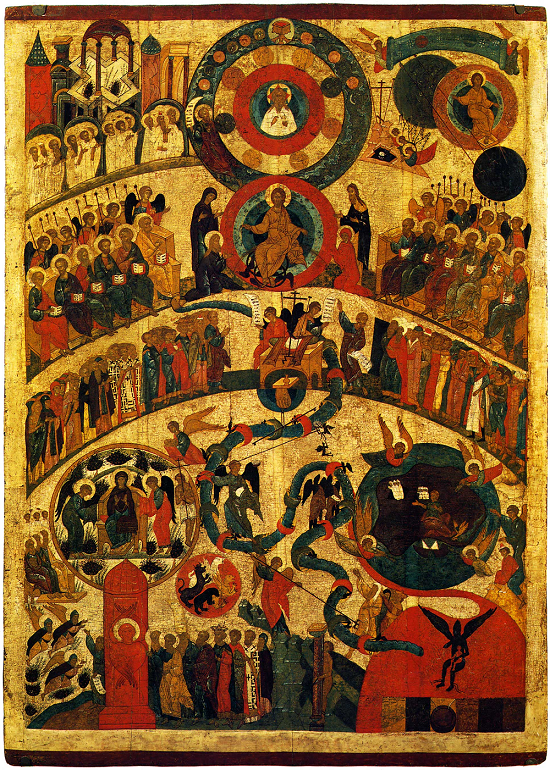Does “All Saints” Include You?
All Saints Scripture Readings

Once upon a time, a long time ago—before I had even begun studying theology, a friend of mine who wasn’t Catholic asked me, “How come you people have so many saints?” Even as a boy, I understood the answer. “Everyone in heaven is a saint,” I told him. “The Church just says that some people are so good that they must be with God.” That was my answer then, and it’s still my answer today.
Our word “saint” comes from the Latin word, sanctus, meaning “holy.” Whatever is holy is set apart from the every-day because it carries with it some special relationship with God. Things—people included—are recognized as holy either because they radiate that special, intimate relationship they have with God, or because they serve as a portal through which people can get in touch with that relationship with God through them. In effect, whatever we recognize as holy provides us with a direct line in both directions between us in the material world and our unseen, unknowable God. As such, our Lord Jesus is the most holy, the paradigm of all sainthood.
There’s a popular saying that I’ve used in the title of the series of novels I’m writing: We Are Not Saints. In essence, that’s a true statement. We—none of us—are not saints. But the statement is incomplete. We are not saints…yet. To enter into an intimate relationship with our Heavenly Father doesn’t mean what some people falsely believe—that it entails becoming a different person. It doesn’t mean renouncing our humanity. It certainly doesn’t mean that we have to go to the extremes that some men and women went to, as we read in the Lives of the Saints. We don’t become perfect by becoming someone different. That’s not being perfect, that’s being a fraud. We see time and again that Jesus always connected with people where they were. They became more perfect by responding to his invitation to experience a metanoia—a change of heart—from self-centeredness to other-centeredness. Becoming a saint means becoming the best you that you can be.
In today’s gospel, Jesus maps out how that would be possible. Regardless of the words Jesus uses in the gospel, the nature of the reward promised us is the same. Our reward for striving to become the best we can be is an intimate relationship with our Heavenly Father. Use whatever terms you want: the “Kingdom of Heaven,” the “Kingdom of God,” the “Reign of God,” the “Face of God,” “children of God,” and so on. They all mean the same thing. The promise is that we shall become holy. Sanctus. Saints.
Here’s how Jesus taught us to make that happen. Permit yourself to become poor in spirit. That means being neither arrogant and entitled nor aggressive, demanding that the world bend to your will. Allow yourself to mourn the bitterness, sadness, hatefulness, destruction, and death we find all around us. Don’t become a part of it. Let it go. Then look at your reflection in the mirror and see that you are meek. By yourself, on your own, without God’s grace, you are powerless to change anything or anyone…outside of yourself. Indeed, it’s the meek who are changed by grace, not the world. Choose to seek righteousness, because righteousness means only a living, breathing, intimate, conscious relationship with God. We create and maintain that relationship through our prayer and meditation.
Become a person of mercy. Mercy consists of giving of yourself. It means showing compassion to those in need, and it means giving others the greatest gift of all—the gift of forgiveness. Remember that when you give someone the gift of forgiveness, you give yourself the gift of freedom from the chains of rancor and resentment. Commit yourself to becoming pure of heart. That means assuring that your intentions are pure and without ulterior, selfish motives. Even the poet T. S. Eliot wrote, “The last act is the greatest treason: To do the right thing for the wrong reason” [Murder in the Cathedral]. Finally, choose to become a peacemaker. That means applying reconciliation to every relationship. It’s a step beyond forgiveness because it seeks to restore what was lost in the breach. True, you can never change another’s heart and mind. Not every relationship is mendable. You’re called only to tear down the walls that you’ve built and open yourself to the possibility of restoration.
There you have it—the Beatitudes, the roadmap to becoming transparent to the glory of God already alive within you. Make these motivating principles your own, and you will become that conduit of God’s presence and God’s grace, holy in this life and a saint in the life to come. Someday, perhaps anonymously, someone may be thinking of you as they celebrate this feast of All Saints. It’s not that far-fetched at all. It’s not even all that hard.
Get articles from H. Les Brown delivered to your email inbox.
